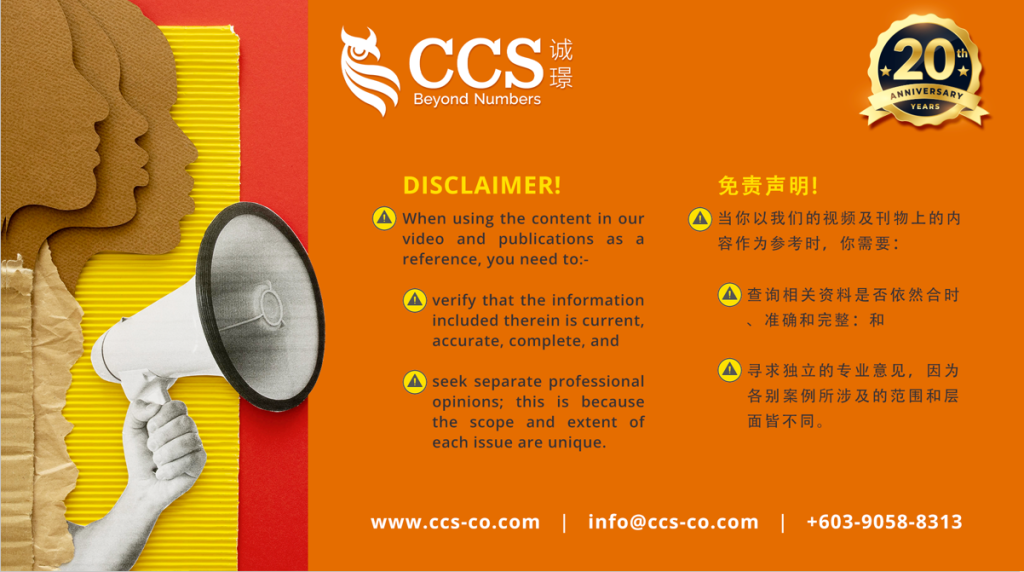The Inland Revenue Board of Malaysia (HASiL) has uploaded the following draft Public Ruling (PR) on its website, inviting the public to provide their comments and feedback before the finalisation:
Draft PR on Deceased Individuals – Part 1: Introduction.
This public consultation’s primary aim is to gather stakeholders’ input regarding matters covered in this preliminary PR.
It’s essential to be aware that, as per HASiL’s guidelines, all received opinions and comments may be shared with the public and will be considered. The opportunity for public feedback on the draft PR was open for comments and had a deadline for submission on or before 27 September 2023, which has since passed.
This public ruling provides information on the estate administration and liabilities of a deceased individual.
It covers topics such as sources of income before death, the process of notifying the IRBM of the death, settling outstanding taxes, determining the validity of a will, responsibilities of the executor, taxation on the income received from the estate, distribution of the deceased’s estate, and the period of administration.
Do you Know
What are the different sources of income for individuals before their death that are considered when administering their estate?
The different sources of income for individuals before their death that are considered when administering their estate include:
- Business Income: This includes income from sole proprietorship, partnership, limited liability partnership, and private limited company. If the individual dies, the sole proprietorship business is automatically considered dissolved. If a husband owns a sole proprietorship business and dies, the sole proprietorship business is taken over by the wife.
- Employment Income: This includes wages, salaries, allowances, leave pay, fees, commissions, bonuses, rewards, perquisites, or allowances concerning the possession or carrying on of any employment. When an employee dies, no remuneration is received due to the termination of the employment relationship between the employee and the employer.
- Interest Income: Interest income is the return or payment for using funds belonging to one party by another. If the lending individual dies, there are no longer any returns or profit sharing from the borrower.
- Pension Income: A pension is a payment made by a former employer to a retired employee. After the death of a pensioner, the husband or wife usually receives the pensioner’s pension.
- Rental Income: Rental income is earned by individuals when the property they own is rented to others. After the owner’s death, the property shall pass to the entitled heirs.
- Commission Income: Individuals receive commission income from a payer company or other individuals after carrying out specific transactions or services as agents, distributors, or dealers. When an individual who acts as an agent, distributor, or dealer dies, no more commission will be received as no more transactions or services are being carried out.
- Dividend Income: The company distributes its profits to its shareholders in the form of dividends when the company makes a profit. When a shareholder individual dies, the shares are transferred to the new shareholder or returned to the original company.
- Annuity Income: An annuity is a series of payments that an individual receives periodically as one of his or her sources of income. Annuity income is usually paid under a contract, agreement, or will. When the recipient dies, he or she receives no further annuity payments.
What is the process for notifying the Inland Revenue Board of Malaysia about the death of an individual and settling any outstanding taxes?
When an individual dies, their death should be reported to the agency responsible for certifying the death, either the nearby hospital or the police.
The National Registration Department will record the death information and issue the death certificate.
Once the death certificate is available, the closest heirs of the deceased should report or notify the Inland Revenue Board of Malaysia (IRBM) of the death as soon as possible.
When reporting the death of the deceased to the IRBM, the closest heirs of the deceased should provide a copy of the death certificate and the Grant of Probate or the Letter of Administration.
The heirs can visit the IRBM office that handles the deceased’s tax file or an IRBM office in their area to report this death.
The executor is responsible for submitting the Income Tax Return Form (ITRF) for the deceased for the year in which the deceased died. This is because the ITRF for the year of death must be submitted to the IRBM no later than 30th April of the following year for those who receive employment income or no later than 30th June for those receiving business income.
The executor must also check with the IRBM to determine the outstanding taxes the deceased owes for the years preceding his death. If the deceased did not pay any outstanding taxes during his lifetime, the executor must pay these outstanding taxes in full, including any penalty amounts imposed.
The executor of a deceased individual shall not distribute any of the assets of the deceased’s estate if the executor knows any outstanding tax liabilities of the deceased that must be paid to the IRBM unless the executor has made provisions to pay the deceased’s tax liabilities as provided under subsection 74(5) of the Income Tax Act.
If the executor fails to pay the deceased’s outstanding tax, the executor may be subject to civil action as provided under section 106 of the Income Tax Act.
How is the distribution of a deceased individual’s estate to eligible beneficiaries governed in Malaysia, and what are the taxation implications for the trustee or beneficiaries?
In Malaysia, the distribution of a deceased individual’s estate to eligible beneficiaries is governed by several legal provisions.
These include the Distribution Act 1958 (Act 300), the Parsee Intestate Succession Ordinance of Straits Settlements, and the Law of Faraid.
The Distribution Act 1958 does not apply to followers of the Majusi religion and Islam. Followers of the Majusi religion are governed by the Parsee Intestate Succession Ordinance of the Straits Settlements, while followers of Islam are subject to the Law of Faraid.
The administration period of the deceased’s estate by the executor ends when the estate is fully wound up or after the estate is fully distributed, which means all the liabilities of the deceased have been settled.
The period of administration by the executor is important because if it is not yet completed, the income received from the estate sources is considered estate income and will be subject to taxation on the deceased’s executor.
If the administration has been completed, any income received from its sources will be considered beneficiary income and subject to taxation on the beneficiary to whom the estate is distributed.
If the will of the deceased provides for the establishment of a trust, the income received from the sources of the estate is considered the income of the trust, and it will be subject to taxation on the trustee or eligible beneficiaries.










